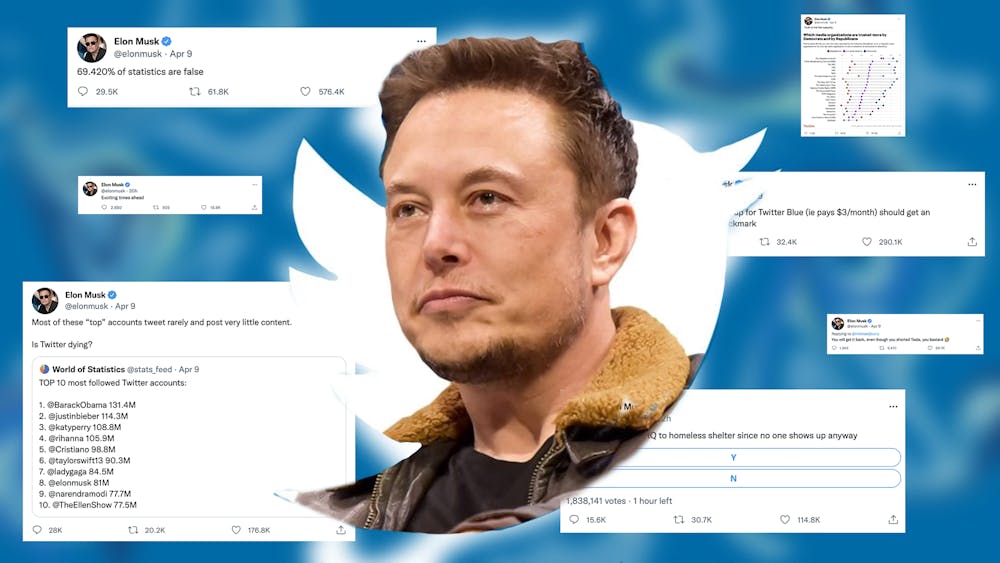There's a genius, billionaire, playboy, and philanthropist taking the world by storm, and it’s not Tony Stark. Instead it’s the man that inspired the character of Tony Stark—Elon Musk. Unsurprisingly, Musk is constantly innovating and seeking out new avenues to make daily life more efficient. However, Musk has also made a name for himself through his promotion of COVID–19 misinformation, hypocrisy regarding artificial intelligence, and transphobic memes. But this time around, Musk isn’t making the news over his controversial persona or technological prowess. Rather, it’s something unprecedented—taking over Twitter.
Recently, Twitter has been going through an intense series of changes including a new CEO and increased censorship practices like censoring former President Donald Trump. While many see these changes as the start of Twitter's decline, some believe that there’s an opportunity for someone to restore Twitter back to its former glory and help the app develop further. Unsurprisingly, Musk believes that he could be Twitter's savior.
In 2006, the social media app Twttr, six months later renamed as Twitter, was launched. In the beginning, Twitter was a side project of Odeo, a podcasting company. After Twitter started to gain momentum, Twitter spun off into its own company, creating the social media app we know today.
On Twitter, users can post anything in a tweet as long as it fits the 280 character limit. Oftentimes, users tweet harmless status updates, memes, and random thoughts. For the average person, Twitter is a fun, low–stakes way to interact with others.
Other times, tweets can be agents for change, highlighted by the ubiquity of #MeToo and #OscarsSoWhite. For public figures such as politicians and activists, their tweets carry more weight and often real–life ramifications due to their large followings.
Musk is notorious for treating Twitter like an average user despite his status as an incredibly influential tech mogul. In 2020, Musk casually tweeted that Tesla stock prices were "too high." In response, stockholders were incredibly alarmed, causing them to scramble and sell their shares. In the following hours after that tweet, Tesla’s stock tanked by ten percent. Eventually the stock price rose back up, but the swift fallout highlights the immense power that Twitter has to alter reality.
Regardless of possible consequences, Musk still tweets his hot takes and opinions—but is that bold or dangerous? Musk's plan to take over the app began with an acquisition of 9.2 percent of Twitter stocks, making him the largest Twitter shareholder, which soon got him into trouble with the U.S. Securities and Exchange Commission (SEC). This follows after his long history with the SEC due to fraud charges about tweets suggesting that Tesla will be taken private.
At first he claimed a passive stake, but switched to an active stake in the company suggesting that Musk is ready to take on Twitter as a new accomplishment to add to his repertoire. Musk claims that his attempt to acquire Twitter rests on protecting what he deems to be freedom of speech. In order to achieve this, Musk wants to distance Twitter from the influence of shareholders by taking the platform private.
In an open letter to Twitter, Musk claimed that “Twitter has extraordinary potential” and that he could “unlock it.” He has now offered an unprecedented $43 billion cash takeover offer, or $54.20 per share in exchange for control of Twitter.
Unsurprisingly, Twitter shareholders and executives are stunned and perturbed at the offer. Many shareholders remain skeptical, including Saudi Arabian Prince Alwaleed bin Talal. Only time will tell if they acquiesce to his offer or continue under current management. But a pressing question still remains—do we really need a billionaire to defend freedom of speech?
Social media has the capacity to instigate great good and dire consequences. In response to social media–fueled disinformation regarding COVID–19 and the validity of the United States 2020 presidential election, Twitter has taken several steps forward to solidify censorship standards and improve the safety and quality of posts on the platform. While much controversy has emerged over Twitter's decision to ban former President Donald Trump due to his role in spreading disinformation, Musk's plan to rebuild Twitter as an absolutist harbinger of freedom of speech could be swinging way too far into the opposite direction.
Musk believes that "having a black–box algorithm promote some things and not other things … can be quite dangerous." But wouldn't blanket allowance of every sort of speech, including hate speech and misinformation, be dangerous as well? While Musk claims that he's the harbinger of free speech, it seems that his vision of free speech isn't considerate of those who are actually impacted by the hate and misinformation often spread on social media—people of color, women, the poor, people with disabilities, and other marginalized groups.
Through this, Musk doesn't seem to care about protecting groups who need to be protected. Instead, he wants a seemingly uncontrolled Twitter where privileged people such as himself can say whatever they want. Musk seems to have little consideration for the consequences of the hate he's promoted, the threats he's made toward journalists, or the misinformation he's spread on Twitter. According to former U.S. Secretary of Labor Robert Reich, Musk's bid to control Twitter isn't really about free speech—it's about power.
Musk doesn't want to make Twitter an open space for uncontrolled free speech. He wants to remove the accountability that comes with tweeting false or hateful comments while providing himself with more control and power in the process.
How can the internet truly be free if those who spread hate and disinformation aren't held accountable? Users want and need spaces where free speech is respected, but hateful, violent posts that instigate real–life violence are swiftly removed. As Musk makes his bid to control Twitter, we need to ask ourselves: Are Musk's grandiose promises an attempt to advocate for free speech, or are they simply a bid for power and control?







